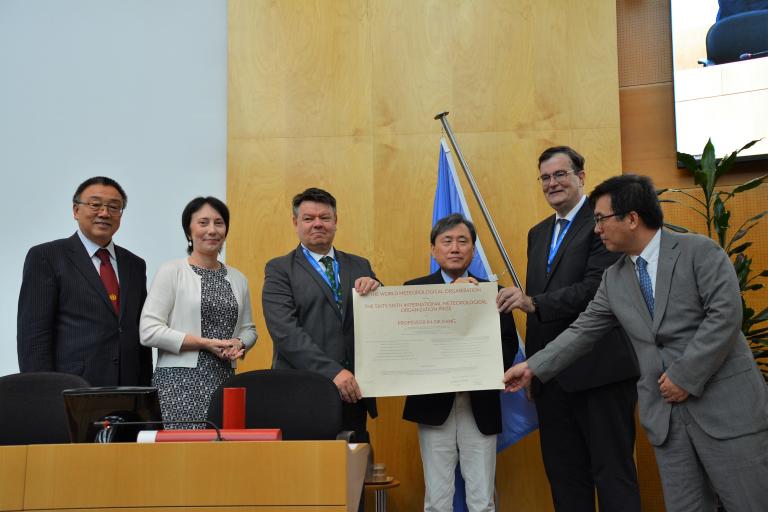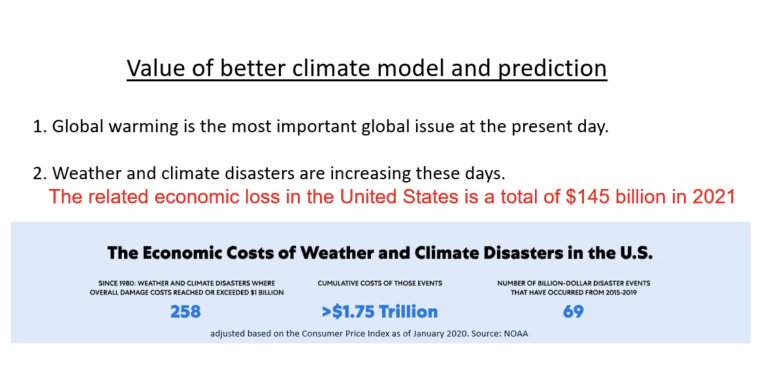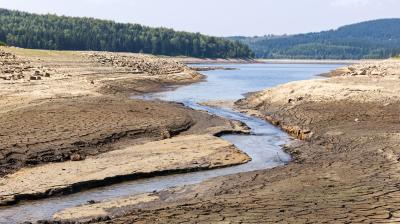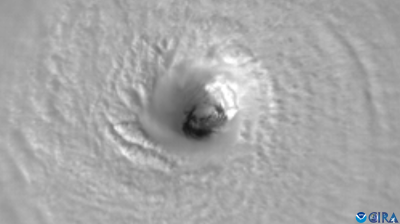IMO Prize winner calls for international climate modelling centre
The winner of the World Meteorological Organization’s most prestigious award has called for an international centre for climate modelling and prediction, saying that this would leverage scarce financial and human resources.

The winner of the World Meteorological Organization’s most prestigious award has called for an international centre for climate modelling and prediction, saying that this is vital for leveraging scarce financial and human resources.
Professor In-Sik Kang, Professor Emeritus at Seoul National University (SNU), Republic ofKorea, and Science Director of Indian Ocean Center, Second Institute of Oceanography, China, made the proposal at the IMO Prize award ceremony on 24 June in a lecture entitled: “Some Thought about Climate Research community: Particular attention to Climate Modelling.”
The IMO Prize (named after WMO’s predecessor, the International Meteorological Organization) is the highest scientific award of WMO. It rewards outstanding work in meteorology and hydrology and contributions to international collaboration in these two fields. WMO’s Executive Council hailed Prof. Kang as “an outstanding climate scientist whose contributions to operational and research climate centres have been invaluable.”
The award cited his major scientific achievements in the areas of climate modelling and prediction, and climate dynamics related to ENSO (EI Niño-Southern Oscillation) and MJO (Madden–Julian Oscillation) and teleconnection,
Prof. Kang said that climate modelling needs a special attention in society. Innovate improvement requires a huge amount of resources. Most importantly, the future manpower problem is at a critical level, he said.
He said his hope was that WMO would initiate what he called a time machine project - an International Centre for Climate Modelling and Prediction.
“There are several international programmes and institutions in the physics, such as the accelerator programme CERN in Switzerland and the international fusion centre in Paris, which spend billions of dollars every year,” he said.
“Although these programmes are important for future energy, the global warming and climate change is probably more important than any other issues in the global community. That’s the reason why we our climate community should ask the global society to support our effort to improve the climate model for better assessment,” he said.

WMO Secretary-General Prof. Petteri Taalas welcomed the initiative. WMO’s Scientific Advisory Panel will now engage with Prof. Kang on the issue.
Prof. Kang has a long history of working with the international climate community, serving as a member of various panels of the World Climate Research Program (WCRP) and has also been a member of WCRP Joint Science Committee (JSC) spanning from 2013 and 2018. In 2018, Prof. Kang was specially awarded with a Foreign Expert Award by the Chinese Government,” Prof. Taalas told the award ceremony.
“Apart from his scientific achievements, in the fields of climate modelling and prediction, Prof. Kang has made a life-long commitment to educating younger generations of the weather and climate science community. As a professor at Seoul National University, he has inspired many prominent next-generation scientists throughout the world, starting in his homeland of the Republic of Korea, as well as in the USA, India, Pakistan, Bangladesh, Egypt, Saudi Arabia, China, and some countries in Africa,” said Prof. Taalas.
Prof. Kang has published more than 170 papers in SCI (Science Citation Index) Journals with some 10,000 citations based on the Google Citation Index.
“Prof. Kang pioneered a multi-model ensemble seasonal prediction system combined with dynamical-statistical corrections. This work demonstrated the value of multi-model ensemble prediction in operational seasonal forecast, which led to the establishment of APEC Climate Center (APCC). This Climate Center currently plays a major role in producing WMO multi-model seasonal prediction products by collecting the seasonal predictions from the 11 operational centers that WMO designated as producers of operational dynamical seasonal prediction,” said WMO President Gerhard Adrian.
In 2017, Prof. Kang was awarded the Medal of Education by the Korean Government and has been recipient of numerous awards throughout his career, a career which has been instrumental in raising the profile of climate science impacts and inspiring future innovators in this field.
The IMO Prize was established in 1955. It consists of three elements:
- A 14-carat gold medal, bearing the WMO emblem and an inscription (“For outstanding work in the field of meteorological science”)
- A parchment scroll bearing the award citation
- A symbolic financial award










